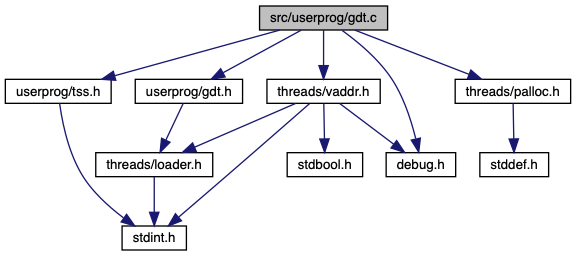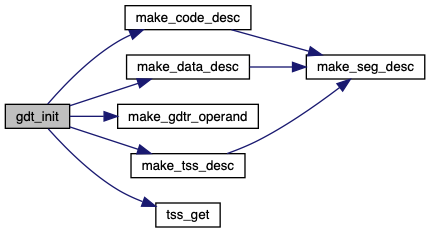#include "userprog/gdt.h"#include <debug.h>#include "userprog/tss.h"#include "threads/palloc.h"#include "threads/vaddr.h"
Go to the source code of this file.
Enumerations | |
| enum | seg_class { CLS_SYSTEM = 0, CLS_CODE_DATA = 1 } |
| System segment or code/data segment? More... | |
| enum | seg_granularity { GRAN_BYTE = 0, GRAN_PAGE = 1 } |
| Limit has byte or 4 kB page granularity? More... | |
Functions | |
| static uint64_t | make_code_desc (int dpl) |
| GDT helpers. More... | |
| static uint64_t | make_data_desc (int dpl) |
| Returns a descriptor for a writable data segment with base at 0, a limit of 4 GB, and the given DPL. More... | |
| static uint64_t | make_tss_desc (void *laddr) |
| Returns a descriptor for an "available" 32-bit Task-State Segment with its base at the given linear address, a limit of 0x67 bytes (the size of a 32-bit TSS), and a DPL of 0. More... | |
| static uint64_t | make_gdtr_operand (uint16_t limit, void *base) |
| Returns a descriptor that yields the given LIMIT and BASE when used as an operand for the LGDT instruction. More... | |
| void | gdt_init (void) |
| Sets up a proper GDT. More... | |
| static uint64_t | make_seg_desc (uint32_t base, uint32_t limit, enum seg_class class, int type, int dpl, enum seg_granularity granularity) |
| Returns a segment descriptor with the given 32-bit BASE and 20-bit LIMIT (whose interpretation depends on GRANULARITY). More... | |
Variables | |
| static uint64_t | gdt [SEL_CNT] |
| The Global Descriptor Table (GDT). More... | |
Enumeration Type Documentation
◆ seg_class
| enum seg_class |
◆ seg_granularity
| enum seg_granularity |
Function Documentation
◆ gdt_init()
| void gdt_init | ( | void | ) |
Sets up a proper GDT.
The bootstrap loader's GDT didn't include user-mode selectors or a TSS, but we need both now.
Definition at line 36 of file gdt.c.
References gdt, make_code_desc(), make_data_desc(), make_gdtr_operand(), make_tss_desc(), SEL_KCSEG, SEL_KDSEG, SEL_NULL, SEL_TSS, SEL_UCSEG, SEL_UDSEG, and tss_get().
Referenced by pintos_init().


◆ make_code_desc()
|
static |
GDT helpers.
Returns a descriptor for a readable code segment with base at 0, a limit of 4 GB, and the given DPL.
Definition at line 116 of file gdt.c.
References CLS_CODE_DATA, GRAN_PAGE, and make_seg_desc().
Referenced by gdt_init().


◆ make_data_desc()
|
static |
Returns a descriptor for a writable data segment with base at 0, a limit of 4 GB, and the given DPL.
Definition at line 124 of file gdt.c.
References CLS_CODE_DATA, GRAN_PAGE, and make_seg_desc().
Referenced by gdt_init().


◆ make_gdtr_operand()
Returns a descriptor that yields the given LIMIT and BASE when used as an operand for the LGDT instruction.
Definition at line 143 of file gdt.c.
Referenced by gdt_init().

◆ make_seg_desc()
|
static |
Returns a segment descriptor with the given 32-bit BASE and 20-bit LIMIT (whose interpretation depends on GRANULARITY).
The descriptor represents a system or code/data segment according to CLASS, and TYPE is its type (whose interpretation depends on the class).
The segment has descriptor privilege level DPL, meaning that it can be used in rings numbered DPL or lower. In practice, DPL==3 means that user processes can use the segment and DPL==0 means that only the kernel can use the segment. See [IA32-v3a] 4.5 "Privilege Levels" for further discussion.
< Limit 15:0.
< Base 15:0.
< Base 23:16.
< Segment type.
< 0=system, 1=code/data.
< Descriptor privilege.
< Present.
< Limit 16:19.
< 32-bit segment.
< Byte/page granularity.
< Base 31:24.
Definition at line 82 of file gdt.c.
References ASSERT, CLS_CODE_DATA, CLS_SYSTEM, GRAN_BYTE, and GRAN_PAGE.
Referenced by make_code_desc(), make_data_desc(), and make_tss_desc().

◆ make_tss_desc()
|
static |
Returns a descriptor for an "available" 32-bit Task-State Segment with its base at the given linear address, a limit of 0x67 bytes (the size of a 32-bit TSS), and a DPL of 0.
See [IA32-v3a] 6.2.2 "TSS Descriptor".
Definition at line 134 of file gdt.c.
References CLS_SYSTEM, GRAN_BYTE, and make_seg_desc().
Referenced by gdt_init().


Variable Documentation
◆ gdt
The Global Descriptor Table (GDT).
The GDT, an x86-specific structure, defines segments that can potentially be used by all processes in a system, subject to their permissions. There is also a per-process Local Descriptor Table (LDT) but that is not used by modern operating systems.
Each entry in the GDT, which is known by its byte offset in the table, identifies a segment. For our purposes only three types of segments are of interest: code, data, and TSS or Task-State Segment descriptors. The former two types are exactly what they sound like. The TSS is used primarily for stack switching on interrupts.
For more information on the GDT as used here, refer to [IA32-v3a] 3.2 "Using Segments" through 3.5 "System Descriptor Types".
Definition at line 25 of file gdt.c.
Referenced by gdt_init().
 1.8.16
1.8.16